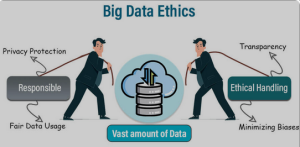Privacy and data ethics are critical considerations in the digital age, as organizations collect, process, and use vast amounts of personal information. Respecting individuals’ privacy and handling their data ethically are not only legal requirements but also crucial for building trust with users and maintaining a positive reputation. Here are key principles and considerations for privacy and data ethics:

Privacy and Data Ethics
-
Table of Contents
ToggleInformed Consent:
- Obtain informed consent from individuals before collecting their personal data. Clearly communicate the purpose of data collection, how the data will be used, and any third parties involved.
-
Data Minimization:
- Collect only the necessary data required for the stated purpose. Avoid unnecessary or excessive data collection, as it minimizes the risk of potential misuse and enhances privacy.
-
Purpose Limitation:
- Limit the use of personal data to the purpose for which it was collected. Avoid using data for purposes unrelated to the original intent without obtaining additional consent.
-
Data Security:
- Implement robust security measures to protect personal data from unauthorized access, breaches, or cyberattacks. This includes encryption, secure storage, and regular security assessments.
-
User Control and Access:
- Provide users with control over their personal data. Offer options for users to access, correct, update, or delete their data, and ensure these processes are user-friendly.
-
Transparency:
- Be transparent about data practices, privacy policies, and terms of service. Clearly communicate how data is collected, processed, and shared. Avoid hidden clauses or practices that may surprise users.
-
Anonymization and De-Identification:
- When possible, anonymize or de-identify data to reduce the risk of identification. Strive to use aggregated or anonymized data for analytics and research purposes.
-
Third-Party Data Sharing:
- Clearly disclose and obtain consent for sharing personal data with third parties. Ensure that third parties adhere to the same privacy and data ethics standards.
-
Cross-Border Data Transfers:
- Comply with data protection laws and regulations when transferring personal data across borders. Be aware of the legal requirements related to international data transfers.
-
Children’s Privacy:
- Implement special safeguards when collecting and processing data from children. Adhere to laws such as the Children’s Online Privacy Protection Act (COPPA) to protect the privacy of young users.
-
Ethical AI and Machine Learning:
- Develop and use artificial intelligence (AI) and machine learning (ML) ethically. Avoid biased algorithms, ensure transparency in decision-making, and regularly audit and assess AI systems for ethical implications.
-
Data Breach Response:
- Have a robust response plan in place for potential data breaches. Promptly notify affected individuals, authorities, and relevant stakeholders in the event of a security incident.
-
Data Ethics Training:
- Provide employees with training on data ethics and privacy. Ensure that staff members are aware of the importance of protecting privacy and understand the ethical implications of data-related decisions.
-
Ethical Advertising Practices:
- Adhere to ethical practices in advertising. Avoid invasive targeting, misleading claims, or practices that may exploit personal data for advertising purposes.
-
Continuous Monitoring and Improvement:
- Regularly assess and update privacy policies and data handling practices based on evolving legal requirements, technological advancements, and changes in societal expectations.
Privacy and data ethics are integral components of responsible data management. Organizations that prioritize privacy not only comply with legal obligations but also demonstrate a commitment to ethical standards that enhance trust among users and stakeholders. As the digital landscape continues to evolve, staying vigilant and proactive in addressing privacy and data ethics challenges is essential.
